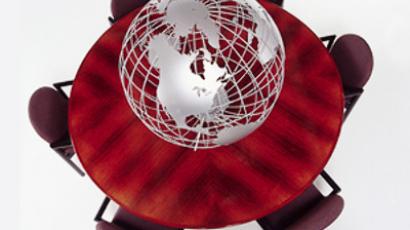ROAR: A developed world is not enough

Participants of the G8 summit in Italy have taken another step towards increasing the size of its club.
The G8 member states will be able to solve the topical problems only with the help of developing economies, Russian analysts say. The first day of the G8 summit in L’Aquila was devoted to the group’s current participants, while for the next two days they are joined by representatives of Asian, African and Latin American countries, and international organizations.
One of the key topics discussed at the summit is fighting the consequences of the world financial crisis. Another task is creating an efficient world architecture of the financial institutes, Evgeniya Voyko, from the Center of Political Conjuncture of Russia said on the company’s web site.
“It is important that the participants of the G8 have understood the necessity to invite for the discussion representatives of rapidly developing countries, such as China, India, Brazil and South Africa,” Voyko said.
Delegations from some African countries will also take part in the summit. “They have been drawing more attention from leading world powers in recent years,” she added.
The competition for influence by the big powers on the territories of emerging economies is also increasing. Voyko refers to the rivalry between Russia, China and the US in oil- and gas-rich regions of the African continent and the competition between Russia, France and Italy over the Maghreb.
“At the same time, it is obvious that the invitation of countries outside the G8 is caused not only by the desire to strengthen efforts in fighting the international crisis,” Voyko believes.
“The summit has recently drawn criticism for being too closed to outsiders and, as a result of it, incompetence,” Voyko said. “The participants in the G8 were blamed last year for the failure to predict the beginning of the crisis,” she added.
Leaders of the G8 appear to have embraced the idea of expanding the organization, even if unofficially. The daily business newspaper RBC quotes German Chancellor Angela Merkel as saying that the present economic problems “could no longer be solved by developed countries on their own.”
Her main message was that the current format of the G8 does not meet the requirements of the present situation, RBC wrote. There are quite a few countries which are not members of “the club of elite states,” but surpass them in some fields, the paper added.
Sergey Karaganov, the dean of the World Economy and Politics department at the State University – Higher School of Economics believes that the summit in Italy will demonstrate the ability of the G8 to conduct modernization.
Writing in the government’s Rossiyskaya Gazeta, Karaganov said that the two previous summits in Russia and Germany made the step of inviting to the discussion of the world’s agenda the leaders of China, India, Brazil, Mexico and South Africa.
“Another step to transform the G8 into the G13 will be made in L’Aquila,” Karaganov stressed. All 13 countries took a fairly active part in the preparation of the summit in Italy, the dean said.
“However, I do not think that the G8 will be officially changed into the G13,” Karaganov stressed. He believes that it is difficult enough for eight countries to discuss seriously and deeply most issues.
At the same time, by inviting other players into the group, the organizers of the summit in Italy may distract the attention of those who ask if the G8 is necessary at all, Karaganov believes. “Such questions have been often asked recently as the organization is turning onto a big PR-event for both its official participants and for antiglobalists,” Karaganov writes.
Some candidates for the formation of the G13 include China, India and Brazil, who are Russia’s partners in such organizations as the Shanghai Cooperation Organization (SCO) and BRIC, and both of these organizations regularly hold their own summits. Political scientist Mikhail Vinogradov has described the SCO, BRIC and the G8 as “rather platforms for discussions than centers for taking decisions.”
“Such organizations are needed first of all for the change of opinions and search for common approaches,” Vinogradov told Nezavisimaya Gazeta daily. “The key issues, as a rule, are decided during bilateral meetings,” he added.
Director of the Center of European Studies Timofey Bordachev told the same source that during summits of BRIC and SCO Russia positions itself as “a participant of the non-Western world.” This is important, because the international relations are becoming more democratic, he noted.
The status of G8 as a club of leading industrial democracies has seriously changed over the last year, Vremya Novostey wrote. “Or, rather the world has changed. If before the crisis some politicians in the West could demand the expulsion of Russia from the G8 for something and speak simultaneously about the invitation of China to the club, now these conversations do not have any sense at all,” the paper said.
The leaders of the 20 leading economies of the world met once in November of last year and again in April of this year, and the “old creditors” had to discuss the most topical financial and trade issues with new creditors – first of all with BRIC, Vremya Novostey noted.
Newspaper Novaya Izvestiya adds that the number of participants in the summit in Italy compared to previous years has increased. The paper quoted Arkady Dvorkovich, aide to the Russian president, as saying that there would in fact be several summits in Italy. Besides India, Brazil and some delegates from Africa, representatives of Denmark, Netherlands and Turkey will join participants of the meeting.
Beginning with the summit in Germany’s Heiligendamm in 2007 the “Eight plus Five (China, India, Brazil, Mexico and South Africa)” meetings were formalized, Vremya Novostey noted. Those leaders of developing economies have been invited to the summit once again, and the G8 is becoming an increasingly expanding club that takes into consideration the interests of those countries, highlights the paper.
Sergey Borisov, RT.














